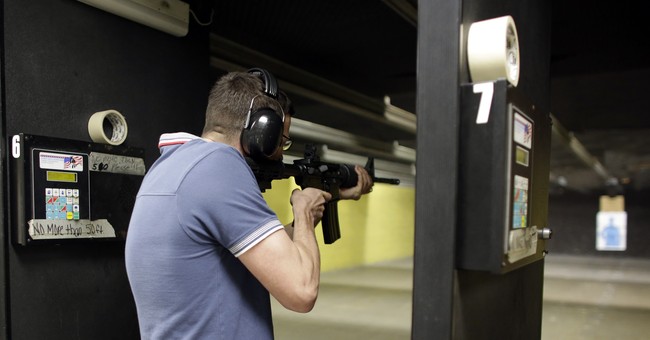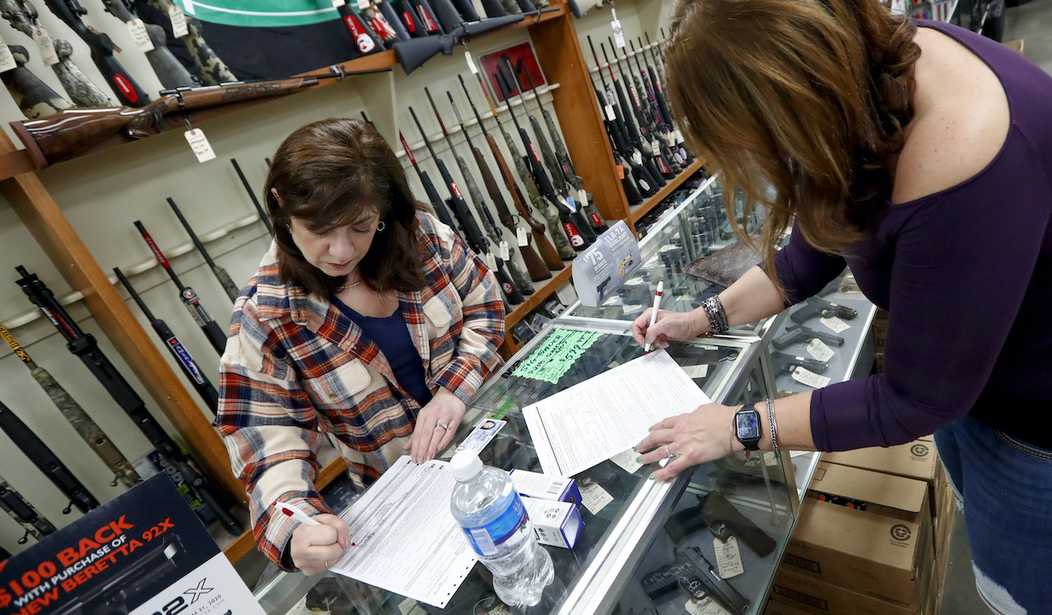Gun sales kicked off with a bang this summer as Americans bought record numbers of firearms in the face of “mostly peaceful” protests and harsh police budget cuts in our largest cities.
Anyway, let’s get to the numbers, which are truly awe-inspiring.
Stephen Gutowski reported for the Washington Free Beacon on Monday:
July 2020 saw an estimated 1,795,602 gun sales—a new record and an increase of 133% over July 2019, according to a Washington Free Beacon analysis of FBI data. July is the fifth consecutive month to set a gun sales record. Chris Killoy, chief executive officer of Sturm, Ruger & Company, said the current spike in sales is unlike anything he has ever seen. The buying spree shows no signs of slowing down and heavy demand will “sustain itself” into the fall, Killoy predicted.
“Having been in this industry for 30 years, I saw the surge in 1994 before the assault weapons ban took place,” Killoy also said. “This is probably the strongest level of demand that I’ve seen.
The Washington Examiner’s Paul Beddard wrote on Monday that the FBI’s background checks increased almost 80% over July of 2019, continuing a trendline going nowhere but up:
On the heels of the 3,931,607 background checks in June, the most ever in the 14-year history of the National Instant Criminal Background Check System, the FBI on Monday said that July checks totaled 3,639,224, the third-highest monthly total ever. March saw the second-highest ever at 3,740,688.
Beddard also wrote that “the FBI has conducted 22,819,271 background checks this year, nearly 44% over last year.”
At this rate it’s possible that background checks could nearly double in 2020 over 2019, which blew past the previous record set in 2017 by “only” about 800,000.
1999 was the first full year of background checks and involved about 9.1 million transactions — a number that more than tripled last year.
Background checks aren’t one-for-one with gun purchases, but they do serve as a decent estimate.
The Denver Channel reported last Thursday:
“It’s human nature. People feel threatened in some way, either they feel their rights might be threatened,” Sheriff Justin Smith in Larimer County, Colorado said. “You can’t go on the internet or watch TV and pick up the news and not see some very concerning stories on spikes in violence around the country.”
Indeed.
Flashback 30 Years: Guns Were in Schools … and Nothing Happened
Left unmentioned by Sheriff Smith: Plans in motion or even in place in various cities to cut back on police protection. The old adage “When seconds count, the police are minutes away” might soon prove perfectly Panglossian.
There was an adorable article on this in Forbes today, in which contributor Aaron Smith claimed that “Coronavirus Continues To Fuel Surge In Gun Sales.”
HCQ won’t stop coronavirus, but an AR-15 might?

I don’t know about you, but my extra ammo purchases have been made with Portland, Ore., in mind, not Wuhan, China. If someone were to try and pull me out of my car, as has happened at more than one “mostly peaceful” protest, they’ll be greeted with a full magazine and a “victim” who has been spending more time at the range.
Nevertheless, Smith writes:
Handguns are flying off the shelves as scared Americans seek self-protection amid pandemic fears and socioeconomic instability. FBI background checks exceeded 3.9 million in June, a new record, as protests over racial injustice and police brutality swept through the U.S. after George Floyd was killed while being detained by Minneapolis police officers. Images of burning buildings dominated the news as police and federal agents faced off with protesters, fueling fears of civil unrest. Scared Americans have rushed to gun shops to buy firearms, particularly small, easy-to-use handguns designed for novices.
If we hyphenate it, do “Scared-Americans” get extra legal protections? Or at least a 10% discount on all ammo purchases?
All kidding aside, I have a few items advice to new members of the Second Amendment Enthusiasts Club.
Maybe you’d like to pass these along:
• Get to the range and practice
• Practice
• Ask for help; folks at the range are typically friendly and eager to share their knowledge
• Practice more
• Train your kids, too. If they’re too young for training, instill in them the serious nature of firearms
I was raised in a house with lots of firearms, plenty of ammo — and zero locks on any of it. There was never any question of me or any of my friends even thinking about touching any of it.
If a rebellious kid, like I was, could take that lesson to heart, any kid can.
The real question is one we might not get the answer to for a while, if ever: How many of these buyers are first-time gun owners actually in need of my advice?
John Lott wrote for RCP on Saturday that the percentage of American households with firearms has, contrary to anti-gun agitprop, remained remarkably consistent:
One of media and gun control activists’ favorite claims is that gun ownership is declining (also here). Their go-to survey for this is the General Social Survey. It found that in the early 1970s, over 50% of American households reported owning guns. But by 2018, that was down to 34%.
Tom Smith, who directs the survey, felt that the large drop would “make it easier for politicians to do the right thing on guns.”
The GSS finding is an extreme outlier, however. If you look at the most recent surveys by Quinnipiac University, CNN, PEW, CBS/YouGov, NBC/Wall Street Journal, ABC News/Washington Post, Monmouth University, and Gallup, ownership estimates range from 40% to 46% of American households. These surveys found very similar percentages going back decades.
If the ongoing surge in gun-buying raises that percentage, then good.
More Americans responsibly partaking in their constitutionally-recognized right to keep and bear arms would be a blessing, particularly in the neverending battle to keep that constitutional protection.
So do please welcome any new gun-owners into the community and, please, I’m begging you, take at least one down to the range with you, OK?










